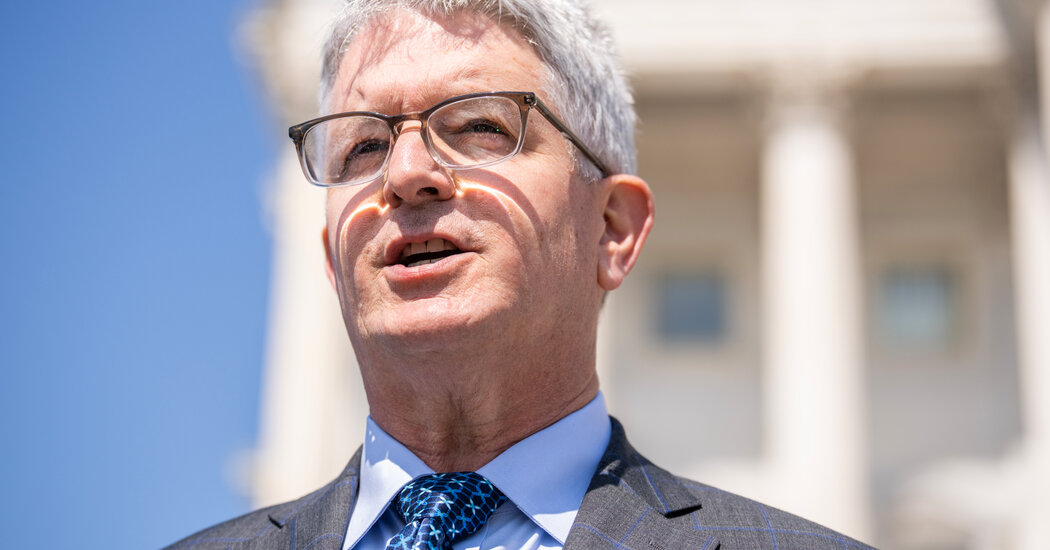Brandon Williams, President Trump’s pick to become the keeper of the nation’s nuclear arsenal, testified on Tuesday that he would not recommend that Mr. Trump restart explosive testing of the deadly weapons.
His statement, during a confirmation hearing before the Senate Armed Services Committee, was unexpected. Other advisers to the administration had proposed that the president resume the test detonations for the sake of national security. The last such explosion in the United States was in 1992.
Mr. Trump nominated Mr. Williams, a former Navy officer and one-term congressman from upstate New York, in January to serve as administrator of the National Nuclear Security Administration, which runs the nation’s atomic weapons complex. It is a semiautonomous agency under the umbrella of the Energy Department.
The most prominent ally of Mr. Trump to call for a testing restart is Robert C. O’Brien, who served as his national security adviser from 2019 to 2021. Last summer in Foreign Affairs magazine, he urged that Mr. Trump, if elected to a new term, resume the detonations, arguing that such a move would help the United States “maintain technical and numerical superiority to the combined Chinese and Russian nuclear stockpiles.”
On Tuesday during Mr. Williams’s confirmation hearing, Senator Jacky Rosen, Democrat of Nevada, argued pointedly against a restart, noting that her state hosted nearly 1,000 nuclear weapon tests, most of them underground, during the Cold War.
She characterized her state as “ground zero” for such tests and said that “millions of people and acres of land were contaminated by radiation” during the Cold War, adding that “we must not ever return” to such risky practices.
A resumption of testing, she said, “could ignite a dangerous, deadly and costly nuclear arms race for no reason.”
She then asked Mr. Williams what his advice to Mr. Trump would be if he were to seek guidance “about returning to explosive nuclear tests.”
During his reply, Mr. Williams said the decision “would certainly be above my pay grade” were he confirmed. But Ms. Rosen cut in.
“Would you recommend explosive nuclear testing?” she asked again.
“I would not advise testing, and I think we should rely on the scientific information,” Mr. Williams said, referring to data gathered from nonnuclear explosive testing and supercomputer modeling carried out by physicists at N.N.S.A. labs.
Mr. Rosen then picked up the argument against testing from a Nevada point of view.
Such activities, she said, would put “more than two million people at risk who live in Las Vegas and not to mention the downwinders — states going East.” She referred to accidents in which earlier underground tests released gases into the atmosphere.
Mr. Williams replied that his primary aim would be to deter the nation’s foes. But he added that the environmental impact would, of course, “be very important and impactful to the citizens of Nevada.”
“I think before those kinds of activities were to take place,” he went on, “particularly so close to a populated area like Nevada, those would be very important considerations.”
Mr. Williams joined the U.S. Navy in 1991 and served as an officer on the U.S.S. Georgia, a nuclear submarine, before leaving the service as a lieutenant in 1996. A one-term congressman, he represented New York’s 22nd Congressional District, an upstate area that includes the cities of Syracuse and Utica. A Democrat, State Senator John Mannion, defeated Mr. Williams in the November election.
In a letter to Mr. Williams on Monday, Senator Elizabeth Warren, Democrat of Massachusetts and a member of the Senate Armed Services Committee, expressed concerns about his lack of credentials and experience for the nuclear job.
At the Tuesday hearing, senators did not discuss Mr. Williams’s professional background. Instead they asked questions about how he planned to retain a skilled work force at the nuclear agency given the Trump administration’s firings and buyouts of federal employees.
Repeatedly, Mr. Williams praised the agency’s personnel and said he would “speak up” for them.
The Senate committee will now vote on Mr. Williams’s nomination, which seems likely to pass muster, and to send it to the full Senate for a confirmation vote.
